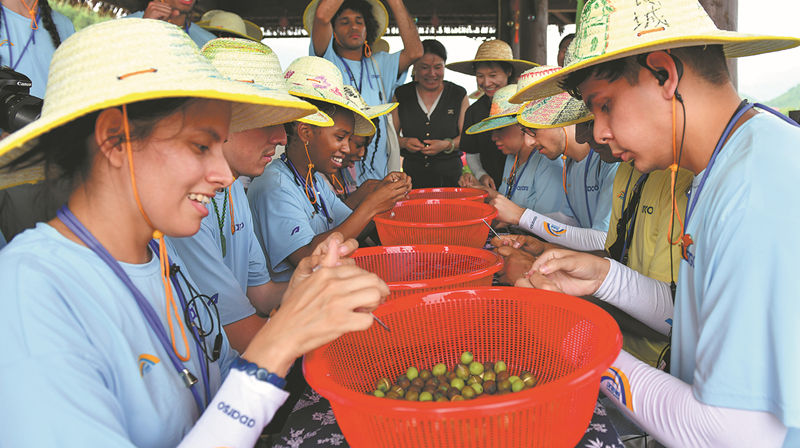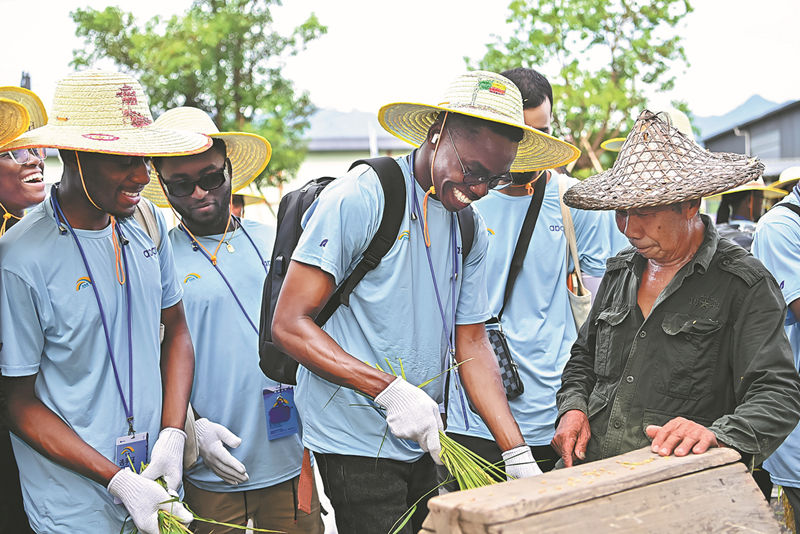
Members of the foreign youth delegation learn sorting camellia seeds during their trip to Wuyishan in Fujian province. [Photo provided to China Daily]
A group of African youth, visiting China for the 24th Chinese Bridge-Chinese Proficiency Competition for Foreign College Students, journeyed across continents to honor Yuan Longping, the "father of hybrid rice", whose innovations have safeguarded food security in their home countries.
They visited the newly opened Yuan Longping Rice Science Popularization Museum in Wuyishan, Fujian province, in August, where they learned about China's hybrid rice history, experienced rice harvesting, and even tried making rice-based handicrafts.
While visiting the museum, Nomenjanahary Rochellinah Raicha, 20, from Madagascar, whose Chinese name is Li Yusha, held up a 20,000 Ariary bank note from her country, which prominently features an image of golden hybrid rice — a heartfelt tribute from the people of Madagascar to the Chinese scientists.
Madagascar, being an agricultural nation, places great importance on rice. Over a decade ago, Yuan's team had ventured into the fields of Madagascar, teaching local farmers how to cultivate hybrid rice in a way that suited their environment.
Chinese hybrid rice has taken root in over 20 African countries. In Madagascar alone, the area under hybrid rice cultivation exceeds 75,000 hectares, with an average yield of 7.5 metric tons per hectare — about triple the yield of local varieties, according to China's National Development and Reform Commission.
"Rice is the major food in my country, and its picture is printed on our currency. I first learned about Yuan Longping in high school," Li said, adding that the opportunity to visit the fields in Wuyishan filled her with excitement, as it represented a deep connection between Madagascar and China.

Participants of the tour experience the traditional way to thresh rice at Yuan Longping Rice Science Popularization Museum. [Photo provided to China Daily]
Seeing a photo of the country's bank note of rice displayed on the wall of the museum surprised her a lot. "I believe that Chinese hybrid rice will one day cover all of Madagascar's fields," she said.
Having studied Chinese at the Confucius Institute at the University of Antananarivo in Madagascar, she often watched Chinese dramas in her spare time. In 2024, she volunteered as a translator on the Peace Ark at Tamatave Port, which brought her a sense of achievement in fostering China-Madagascar friendship.
Another youth, Yousef Ehab, 21, from Egypt, whose Chinese name is Zheng Lian, grew up near the pyramids, a place bustling with Chinese tourists, and Egyptian Chinese-speaking guides, which sparked his interest in China since childhood.
As his family runs a rice import business in Egypt, he learned Yuan's story long ago. "The scientist not only solved China's food problems but also spread this technology worldwide, benefiting many developing countries, including those in Africa," he said.
In Egypt, Chinese rice technology has been adopted, significantly improving local rice production efficiency and farmers' yields, Zheng said, expressing hopes for strengthening agricultural cooperation between China and Egypt.
China's efforts in Africa extend beyond hybrid rice. The country has established 24 agricultural technology demonstration centers across the continent, promoting over 300 technologies.

Copyright © General Office of Fujian Provincial People's Government
Website Identification Code 3500000049Registration Number: 15003084
All rights reserved. The content (including but not limited to text, photo, multimedia information, etc) published in this site belongs to fujian.gov.cn.
Without written authorization from fujian.gov.cn, such content shall not be republished or used in any form.